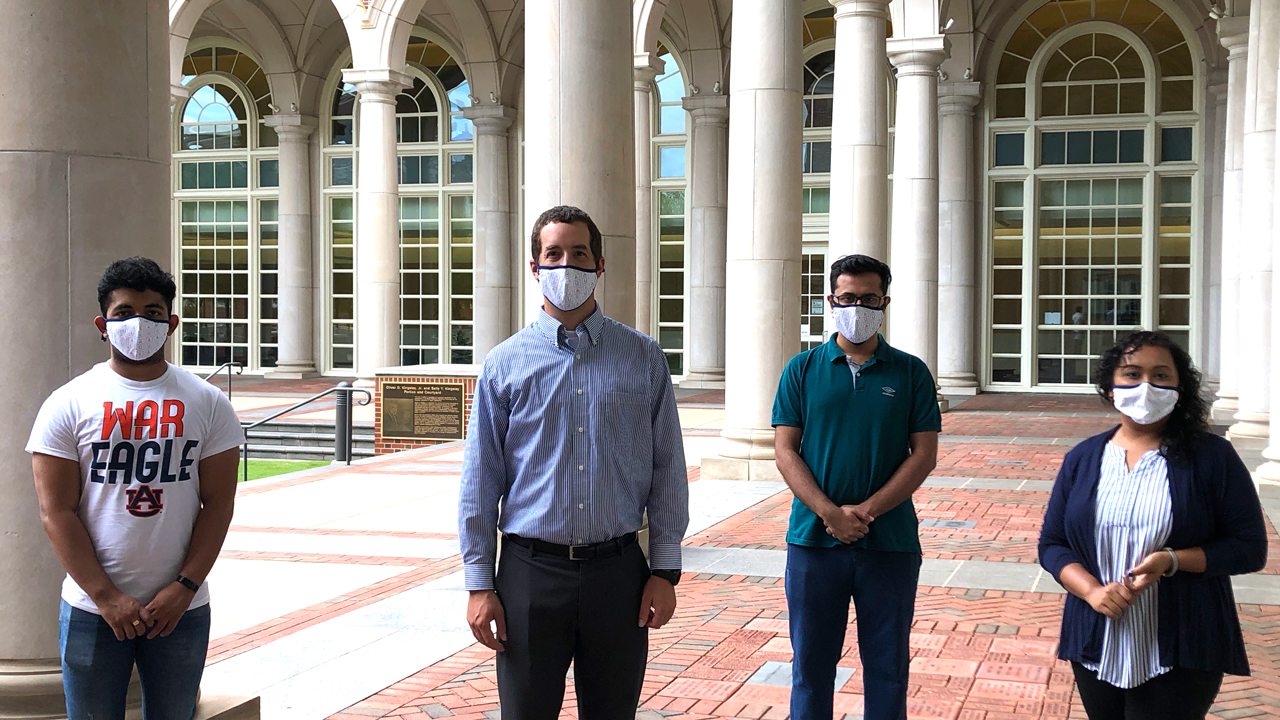Assistant professor wins major NIH award to develop therapeutic proteins
Published: Sep 10, 2020 2:05 PM
By Cassie Montgomery
For Robert Pantazes, an assistant professor of chemical engineering, the decision to devote his research to therapeutic proteins was made for two reasons. Professionally, more effective techniques for designing proteins will improve the efficiency and safety of the chemical engineering industry. However, his particular focus on optimizing therapeutic proteins is more personal.
“I’m focused on therapeutic proteins in particular because over the course of my life, I’ve had a number of complex health challenges and I’ve been fortunate to always be able to work with really talented doctors who helped me figure out the solutions to those challenges,” he said. “Not everyone has access to the same resources and opportunities that I did and so health has always been a major interest area of mine – how to make it easier to solve health problems.”
Pantazes will further his research in therapeutic proteins with a $1.75 million Maximizing Investigators’ Research Award (MIRA) from the National Institute of General Medical Sciences (NIGMS), a part of the National Institutes of Health (NIH). The award is designed to support Pantazes’s research lab at Auburn University where he and his graduate students are developing and experimentally testing computational methods to design therapeutic proteins.
“We all have proteins in our blood called antibodies that are part of our immune system. When you get an infection, your body makes antibodies to provide long-lasting protection. Our research focuses on how to design those antibodies better and faster than you can using other approaches and then to expand beyond antibodies to other types of proteins that have the potential to allow us to treat diseases more quickly than with other strategies,” he explained.
Specifically, Pantazes is interested in personalizing medicine to meet an individual person’s needs. This approach, making something to meet a need when a need is identified, differs from the method more commonly used where a therapeutic is prescribed from a pre-selected set of options. There are many situations where personalized medicine could benefit a patient, including when treating a cancer patient or fighting antibiotic resistant bacteria.
“There are a lot of different ways this research could be applied and one of them is cancer. We could do DNA sequencing of the cancer and then design treatments specifically to target whatever genetic variation a patient has,” he said. “Another application could be for antibiotic resistant bacteria – things like MRSA. Antibiotic resistant bacteria work through what are known as escape mutations, where the bacteria acquires some change that helps it escape the treatment. That shows up in the DNA. If we can sequence the DNA and apply the technology we’re working on, you could design a treatment in response to the mutating antibiotic resistant bacteria.”
The technology he references is the Algorithm for Ultra Rapid Binding Interaction Engineering, or AUBIE. The software, which took 18 months to develop, was supported by an intramural grant from the Samuel Ginn College of Engineering.
“AUBIE will allow pretty much anyone to design a protein to bind to a specific target that you want it to bind to and it will do those calculations in as little as a few minutes on a personal computer,” Pantazes said. “A lot of these types of strategies and approaches have required using super computing resources and taking weeks or months, even on a super computer. Part of what we’re working on is software that lets somebody do this in a few minutes with the sort of computers most people have access to.”
With the MIRA funding, Pantazes envisions enhancing the capabilities of the AUBIE software, specifically the speed in which the software can do calculations and improving how it predicts optimum protein design.
“Over the next 10 years, what I would like to do is get to a point where we can reliably and consistently design a protein to bind to whatever we want it to bind to,” he said. “The goal of my career is to develop an effective computational method to design proteins for whatever purpose someone might want to use them for.”
NIH MIRA grants are designed to provide support for the program of research in an early stage investigator’s laboratory that falls within the mission of NIGMS. The grant is designed to support research on technology development and computational approaches, as well as basic biomedical sciences, translational and clinical research, and all phases of the scientific process.
Media Contact: , cmontgomery@auburn.edu, 334.844.3668

Robert Pantazes (second from left) with graduate students Ritankar Bhattacharya (left), Varun Chauhan (center) and Sumaiya Islam (right).


